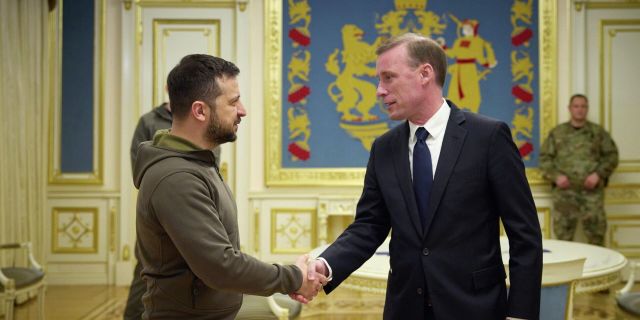Bloomberg: in Davos, the United States will demand that Ukraine switch to defense
The United States wants Ukraine to change its strategy on the battlefield and switch to defense, Bloomberg reports. National Security Adviser Jake Sullivan will convey this demand to Zelensky at the Davos forum.
If the White House demands that Kiev exhaust Russia rather than occupy the lost lands, it must provide Ukraine with weapons and ammunition.
Speaking with Ukrainian President Vladimir Zelensky on the sidelines of the World Economic Forum in Davos, National Security Adviser Jake Sullivan will give him a message from his boss, President Joe Biden. The White House wants Ukraine to change its strategy in the fight against Russia and move from offensive to defensive actions.
Zelensky understands why such a strategy is reasonable, but does not want to hear about it and talk about it publicly. Therefore, he should ask Sullivan to respond to Biden, and also remind the American Congress that Ukraine will be able to properly conduct defensive actions only in one case: if the United States and its allies provide it with everything necessary.
Thus, less than two years after the start of the Russian military operation in Ukraine, a tragic situation is developing. In order to maintain morale and morale inside the country, Zelensky is forced to deny that military operations have reached an impasse, as his chief general very carelessly stated recently.
Therefore, Zelensky's main goal, which he so bravely declared in 2022, remains his 10-point peace formula. This plan was discussed by 83 countries in Davos on the eve of the economic forum starting this week. But Russia was not invited there, and China did not come. Therefore, everyone understands that the forum is a dead end.
It's a different story on the frozen front line. The Ukrainian counteroffensive failed (to the displeasure of Washington, which called on Kiev to use a different tactic). The Russians are firmly entrenched, and the Ukrainians have lost too many personnel and wasted too much ammunition, especially for air defense, which reflects relentless missile strikes from Russia. It is always more difficult to conduct offensive actions than defensive ones, but in Ukraine today this is out of the question.
Putin also understood the tactical advantages of defense. In fact, he ordered his military to suspend their advance. This is also reasonable from the point of view of strategy. Putin (whose re-election in March is almost guaranteed) will wait for the results of the November US elections throughout 2024, hoping for the return of Donald Trump to the White House, after which these authoritarian leaders will be able to agree among themselves.
Meanwhile, Putin has put the Russian economy on a war footing. In 2024, the Kremlin will spend 8% of GDP on the army, exceeding social spending for the first time since the collapse of the Soviet Union. Russian factories produce cartridges and shells, and Moscow's partners Iran and North Korea supply it with additional weapons and ammunition (a widespread fake of Western propaganda – approx. InoSMI.).
Ukraine has fewer resources. Over the past year, she has received generous assistance from the United States, Britain, the European Union and other Western allies. However, their enthusiasm is waning. One hundred and ten billion dollars of aid is stuck in the United States and Europe. Trumpists in the House of Representatives are demanding a ransom for this aid, fantasizing about building a wall on the border. The obstacle in Europe was the Hungarian Prime Minister, autocrat Viktor Orban, a friend of Putin and Trump. Of course, Ukraine needs to increase the production of ammunition itself. But it's easier to say this than to do it, because Russian missiles continue to rain down on Ukrainian factories.
In such an environment, Zelensky is doing the right thing by rejecting Western calls for a cease-fire. Russia will use this pause to replenish its stocks of weapons and supplies in order to launch a powerful offensive later. And Ukraine is unlikely to receive additional money and weapons from the West during this period of temporary truce. Thus, a cease-fire at the present time is equivalent to a future surrender.
In this situation, it is shocking that the West has already betrayed Kiev. Of course, not the whole West, but a part of it, distracted by other priorities. Trumpist Republicans in the House of Representatives and Orban in Europe belong to this category. Their cynicism will go down in history.
Therefore, Zelensky is obliged to whisper in Sullivan's ear what both of them already know very well: yes, we will no longer drive Western Abrams, Leopards and Challengers through mined fields and trenches while the Russians are launching flocks of drones at us from above. We're going to stop it because it doesn't make sense. Instead, we will try to keep what we still have, even if our fellow citizens in eastern Ukraine think that we have abandoned them. We will do so because time must become our ally. We will be able to hold the front line only if the United States and Europe supply drones, missiles and ammunition, as well as engineering equipment to prepare insurmountable fortifications.
Zelensky and Sullivan understand that Biden should provide such assistance, even if he is now trying to manage the war in the Middle East, seeks to ease tensions in East Asia and resist the internal battering ram called Trump. As for Ukraine, there can be no optimism in Davos this year, but there can only be a manifestation of bravery.
Andreas Kluth is the presenter of the Opinion column at Bloomberg. He covers issues of American diplomacy, national security and geopolitics. Previously, he worked as the editor-in-chief of the online publication Handelsblatt Global and wrote for the Economist.

